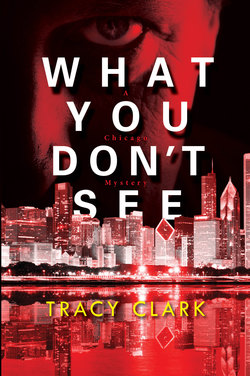Читать книгу What You Don't See - Tracy Clark - Страница 13
На сайте Литреса книга снята с продажи.
ОглавлениеChapter 7
I cooled my heels outside the door, giving people who passed the once-over, making sure no one got too close, occasionally glancing up at the television sets to check the news. I was watching an older man in tennis whites pass me on his way to the courts when I heard a gasp go up and turned to see a breaking-news alert crawl along the bottom of the nearest screen. Cop killed. Suspect in custody. The choppy footage, shot from a news helicopter, showed blue-and-whites, lights flashing, cordoning off a city block in Bridgeport. My throat tightened. I couldn’t move from the door, and I couldn’t hear the report from where I stood. Cop killed. I thought of all the cops I knew, friends, more than that, family. Eli, but it couldn’t be him. Not his district. No ID yet on the dead cop. I felt for my phone, but just then it vibrated in my pocket. I slid it out, glanced at the number. Ben.
“Who is it?” I asked before he could say anything.
“No one we know. New detective. Eighteen months in.”
I felt a selfish wave of relief that it wasn’t any of my friends, but the relief was short lived. A cop was dead. I felt the loss, mourned it, as though I’d lost a member of my family all the same.
“Cass? She was partnered with Farraday.” Just the mention of the man’s name nearly took my breath away, and it felt like someone had just kicked me in the stomach. “They hit the door without calling for backup. Her first, him bringing up the rear. She caught a round to the head. Dead before she hit the ground.” Ben paused.
He was waiting for me to say something, but I was still on Farraday. I was back on the roof where I had almost died, the taste of blood in my mouth as I lay dying; back to another door Detective James Farraday had barreled through, hoping to make his bones. Almost three years ago now. A pit grew in my stomach, my heart raced, and the years fell away. The rooftop was here, now, again.
Ben continued. “I got the details from Corrigan. We used to work the same district. The news is just breaking, but I wanted you to hear it from me.”
Farraday was a menace, a danger to himself and others. I’d said as much to the bosses, but they hadn’t listened, because Farraday was connected, the latest in a line of top-brass cops who shielded him from his own incompetence.
She. Eighteen months in.
We’d been after a banger on that roof, and I’d nearly talked him down. That was when Farraday had made his play. He had stumbled in, gun drawn, and it had all gone wrong. Jimmy Pick. That was the banger’s name. He hadn’t meant a thing to Farraday; neither had I, or Ben. I drew my hand up to my chest now, feeling for the healed-over spot where Pick’s bullet had pierced my flesh. Pick was dead. I killed him. I wouldn’t have had to had it not been for . . .
“And him?” I croaked it out, my voice sounding far away.
“Not a scratch. He’s blaming the screwup on her, but this time I don’t think it’s going to fly. This is about as bad as it gets.”
I watched the people passing by, held the door, the phone sweaty in my hand.
“I can sub you out if you want.” He was at the front of the club, watching who came in and who went out.
“No. I’ve got it. Ben? How old was she?”
He took a moment to answer. “Thirty-two. Second-generation cop. Had a two-year-old at home.”
I ended the call, squared my shoulders, my fists clenched tight, shaking. “Oh, my God.”
* * *
Allen, peering through a pair of half-glasses, stared out the window of her limo as we rode up Michigan Avenue a short time later. The quiet was just fine by me. I didn’t feel like talking. Besides, I’d known Allen just two days, and already I’d had my fill of her. Elliott was at the wheel, Ben was beside him in the passenger seat, and I sat across from Allen, both of us trying not to look at each other. To pass the time, I stared at the normal people outside the window and longed for their company.
I thought of my grandfather who had worked at a die-cast factory for more than forty years, day in, day out for union pay, and my grandmother who had worked just as long for the phone company before Ma Bell split up and died. They had been working people, not by any means wealthy. I got to college with good grades, a little set aside, and loans, which had taken me years to pay off. No one I knew, and no one they knew, ever rode in limousines, unless someone had died and they were part of a funeral procession.
The three-flat I now owned was the only thing my grandparents had managed to scrape together, and I maintained it now because it had been theirs and they’d fought so hard to keep it. I’d never sell it. Never.
